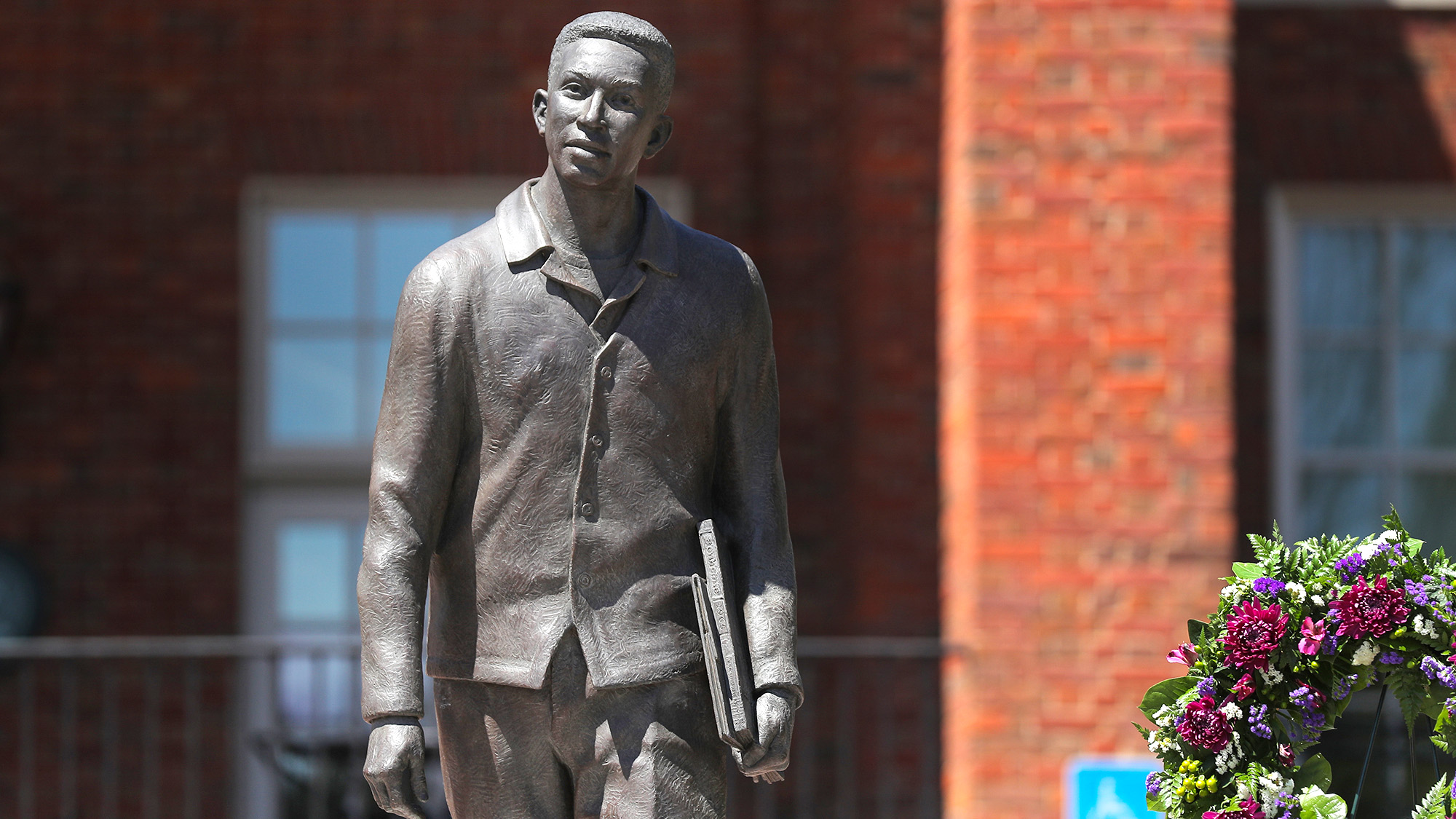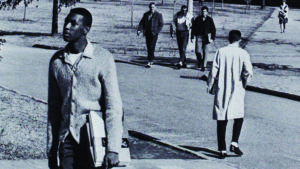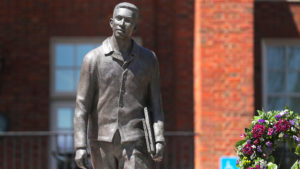



By Francisco Rendon
When Furman University unveiled a bronze statue of Joseph Vaughn, its first Black student, it did more than celebrate one student, said Ed Good, chair of the university’s Board of Trustees. “It represents a turning point in civil rights and racial justice for Furman, for Greenville, the upstate and South Carolina,” he said at the April 16 unveiling ceremony outside the campus’ Duke Library.
The ceremony honored the legacy of one of the university’s most distinguished graduates, who graduated cum laude in 1968 with a degree in English after participating in the Pershing Rifles, the Baptist Student Union, the Color Guard, Collegiate Educational Service Corps and as chairman of the “Talk-a-Topic” committee which, according to the Furman University website, organized forums for discussions about poignant issues like the Vietnam War, race relations and student rights.
While on campus, Vaughn became a Baha’i and wrote an article in The Furman Paladin titled “Why I Am A Baha’i, Not A Christian.” In it, he discusses the “need for a new religion to revitalize mankind spiritually, break down barriers between people, and lay foundations for a unified world based on justice and love.”


During his senior year he was vice president of the Southern Student Organizing Committee and led a peaceful protest after the February 1968 Orangeburg Massacre, the killing of three by police at an anti-segregation demonstration in South Carolina. Vaughn led another peaceful protest after the assassination of the Rev. Martin Luther King Jr. in Memphis.
Prior to his time at Furman, Vaughn went to Sterling High School in Greenville and graduated third in his class, serving as president of the student body, the French Club, and the Physics Club. He also was president of the Greenville and Southeastern NAACP Youth Chapter. He was selected by Furman University vice president Francis Bonner and civic leader Sapp Funderburk to be the university’s first African American student. According to “This is Him: The Life of Joseph Alan Vaughn,” a biographical essay by Brian Neumann, they felt Vaughn had the personality to withstand the pressures of desegregation.
Rodney Acker, a 1973 Furman graduate and the university’s first Black football player, was briefly a student alongside Vaughn. Acker, also a Baha’i, says he remembers his fellow student as outgoing and jovial, while he himself was more reserved and shy. Before their time together as students, Acker says, he had heard of Vaughn — as had everyone else in town.
“Greenville is not really a big town, especially back then, so just about everybody knows each other,” Acker says. “I have a brother that was his classmate, so I knew him. The fact that he was the first Black student at Furman made him sort of famous, locally at least.”
The April 16 dedication of the statue featured words from University President Elizabeth Davis; Chair of the Board of Trustees Ed Good; Furman NAACP Chapter President Qwameek Bethea; Vaughn’s descendant Marcus Tate; and the university’s diversity officer Michael Jennings. The Greenville Baha’i Community Drummers performed opening and closing musical selections.
“Joe’s becoming a student here made a statement: Furman was ready to take that first step toward acceptance and equality,” Good said. “Unfortunately we are reminded too often that some people’s attitudes have not changed in the more than 50 years since. This statue is a rebuke of old notions and a promise that we will not return. It is a symbol that Furman, now and forever, values diversity and inclusion.”
The Baha’i community’s participation was led by Dorcus Abercrombie of Greenville, who was originally alerted to the statue’s dedication during an online discussion with a Furman University professor.


“The organizers said they were happy that the Baha’is participated,” Abercrombie says. “And I feel like I got to know him [through this experience] because I read about him. And there are people in the greater community that knew him. He did a lot, for the Faith and as an educator.”
Vaughn died in Columbia, South Carolina, in 1991 at age 45, after years spent as an English teacher, president of the Greenville County Association of Teachers and the South Carolina Education Association.
The statue was created at the recommendation of Furman University’s Task Force on Slavery and Justice, formed in 2017 to examine the institution’s historical connections to slavery so it can better learn from its past. The task force also recommended the observance of Joseph Vaughn Day on Jan. 21.
That task force, in the second edition of its “Seeking Abraham” report in 2019, wrote about the complex relationships the institution’s founders had with the issues surrounding race and the resulting legacy.
“Richard Furman and James C. Furman, father and son, stand alone among those who shaped the identity of Furman University in the decades before the Civil War,” the task force wrote. “Richard championed Baptist education throughout his life and built the institutional structures that gave birth to the university. James nurtured the school from a struggling seminary in a rural backwater to a respectable college in a growing city.” The father and son also shaped public opinion in South Carolina in support of slavery and, in the case of James, in support of secession.
The statue was created by sculptor Steven Whyte, who observed the ceremony from his studio in Carmel, California.
Chelsea McElvey, a Furman student who proposed the statue, said she hopes the history of Vaughn’s legacy will inspire current and future generations.
“As a student of color, representation matters to me. I proposed the Vaughn statue in hopes that Furman’s students will challenge themselves to confront this history,” McElvey wrote. “I am also from Charleston and hope the momentum from places like Furman can reverberate across the state.”


![]()
![]()
Whether you are exploring the Bahá'í Faith or looking to become an active member, there are various ways you can connect with our community.
Please ensure that all the Required Fields* are completed before submitting.